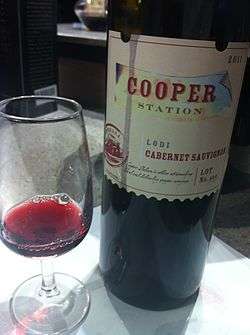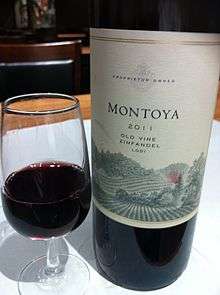Lodi AVA
| Wine region | |
 Cabernet Sauvignon from Lodi | |
| Type | American Viticultural Area |
|---|---|
| Year established | 1986, amended in 2002[1] |
| Country | United States |
| Sub-regions | Alta Mesa AVA, Borden Ranch AVA, Clements Hills AVA, Cosumnes River AVA, Jahant AVA, Mokelumne River AVA, Sloughhouse AVA |
| Climate region | Mediterranean |
| Total area | 551,000 acres (223,000 ha)[2] |
| Size of planted vineyards | 90,000 acres (36,000 ha)[2] |
| Grapes produced | Albarino, Alicante Bouschet, Alvarelhao, Barbera, Cabernet Franc, Cabernet Sauvignon, Carignane, Charbono, Chardonnay, Chenin blanc, Cinsault, Colombard, Dolcetto, Dornfelder, Flame Tokay, Gamay noir, Graciano, Grenache, Kerner, Lemberger, Malbec, Malvasia, Marsanne, Merlot, Mourvedre, Muscat Canelli, Petit Verdot, Petite Sirah, Pinot gris, Pinot noir, Pinotage, Riesling, Roussanne, Rubired, Ruby Cabernet, Sangiovese, Sauvignon blanc, Souzao, Symphony, Syrah, Tannat, Tempranillo, Tinta Cao, Touriga Nacional, Trousseau gris, Valdiguie, Verdelho, Viognier, Zinfandel[2] |
Lodi AVA is an American Viticultural Area located in the Central Valley of California, at the northern edge of the San Joaquin Valley east of San Francisco Bay. The AVA gained approval as a designated wine growing area in 1986 and includes 551,000 acres (223,000 ha) of which 103,000 acres (42,000 ha) are currently planted with wine grapes.[2] In 2002, the area included in the AVA was expanded by 93,500 acres (37,800 ha) (10,840 acres (4,390 ha) planted) along the southern and western portions of the original AVA boundaries in San Joaquin County. The appellation includes land in southern Sacramento County and northern San Joaquin County. It is bounded on the west by Interstate Highway 5 and to the east by the political borders for the adjacent El Dorado, Amador, and Calaveras Counties.[3]
History

The Lodi region has been home to grape growing since at least the 1850s when wild grapes would grow down from trees along the edge of rivers. This led some trappers to call the Calaveras River, which runs through the southern portion of the area, "Wine Creek".[4]
Climate and geography
Lodi has a Mediterranean climate similar to that along the Mediterranean Sea, with warm days and cool nights. The soil, unlike many other appellations, varies within the AVA, though in most places it is a deep loam that occasionally is covered with large rocks, similar to the French region of Chateauneuf du Pape.[2]
Grapes and wines
Although the appellation is probably best known for its old vine Zinfandel, Lodi also produces a large quantity of Merlot, Chardonnay, Cabernet Sauvignon, and Sauvignon blanc.[2]
References
- ↑ Code of Federal Regulations. "§ 9.107 Lodi." Title 27: Alcohol, Tobacco and Firearms; Part 9 — American Viticultural Areas; Subpart C — Approved American Viticultural Areas. Retrieved Jan. 25, 2008.
- 1 2 3 4 5 6 Appellation America (2007). "Lodi (AVA): Appellation Description". Retrieved Jan. 25, 2008.
- ↑ Rieger, Ted (2003). "Subdividing Lodi—Proposal Supported for 7 Sub-AVAs". Wine Business Monthly. Aug., 2003.
- ↑ "The Wine Institute - The Appellations of California Wine".
External links
- the Lodi, CA ("LoCA") Winegrape Commission